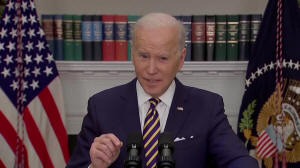Biden bans Russia oil imports to U.S., warns gasoline to rise further
 Send a link to a friend
Send a link to a friend
 [March 09, 2022]
By Trevor Hunnicutt, Steve Holland and Andrea Shalal [March 09, 2022]
By Trevor Hunnicutt, Steve Holland and Andrea Shalal
WASHINGTON (Reuters) -U.S. President Joe
Biden on Tuesday imposed an immediate ban on Russian oil and other
energy imports in retaliation for the invasion of Ukraine, amid strong
support from American voters and lawmakers, even though the move will
drive up U.S. energy prices.
"We're banning all imports of Russian oil and gas energy," Biden told
reporters at the White House. "That means Russian oil will no longer be
acceptable in U.S. ports and the American people will deal another
powerful blow to (Russian President Vladimir) Putin's war machine."
The ban caps sweeping U.S. and European sanctions imposed on Moscow for
launching the largest war in Europe since World War Two. Russian strikes
have targeted Ukrainian cities and killed hundreds of civilians, some as
they tried to flee their homes.
Biden, who has pledged that U.S. soldiers will not go to Ukraine to
fight, voiced America's support for the Ukrainian people, and predicted
their ultimate victory.
"Russia may continue to grind out its advance at a horrible price, but
this much is already clear: Ukraine will never be a victory for Putin.
Putin may be able to take a city, but he'll never be able to hold the
country," he said.

Oil prices jumped on the news, with Benchmark Brent crude LCOc1 for May
climbing by 5.4% to $129.91 a barrel by 1345 GMT.
Retail gasoline prices in the United States surged to an all-time record
on Tuesday, with the average cost of a retail gallon of gasoline hitting
$4.173 early Tuesday, according to the American Automobile Association.
Biden signed an executive order on the ban soon after his remarks. The
ban goes into effect immediately, but gives buyers 45 days to wind down
existing contracts, a senior administration official told reporters.
The move also bans new U.S. investment in Russia's energy sector, and
prohibits Americans from participating in any foreign investments that
flow into the Russian energy sector, the official said.
Biden has been working with allies in Europe, who are far more dependent
on Russian oil, to isolate Russia's energy-heavy economy and Putin.
Britain announced shortly before Biden's remarks that it would phase out
the import of Russian oil and oil products by the end of 2022.
The United States consulted closely with allies on the ban, but did not
ask them to join in, and did not expect that they would, the official
said.
Biden said sanctions imposed by the United States and its allies had
already caused the Russian economy to "crater" and vowed to continue
ratcheting up pressure on Moscow to stop a war that forced more than 2
million people to flee the country.
PROFITEERING WARNING
The United States imported more than 20.4 million barrels of crude and
refined products a month on average from Russia in 2021, about 8% of
U.S. liquid fuel imports, according to the Energy Information
Administration. The United States also imports a negligible amount of
coal from Russia.
[to top of second column]
|

U.S. President Joe Biden announced a ban on Russian oil and other
energy imports on Tuesday in retaliation for the invasion of
Ukraine, underscoring strong bipartisan support for a move that he
acknowledged would drive up U.S. energy prices.
 Biden predicted prices would rise
further as a result of "Putin's war," but pledged to do all he could
to ease the pain for the American people. He also warned U.S.
companies against profiteering or otherwise exploiting the
situation.
"The decision today is not without costs here at
home. Putin's war is already hurting American families at the gas
pump ... I'm going to do everything I can to minimize Putin's price
hikes here at home," Biden said.
"Russia's aggression is costing us all. It is not time for
profiteering," said the Democratic president, who has repeatedly
targeted big U.S. companies for unfairly jacking up prices.
In November, Biden had cited mounting evidence of anti-consumer
behavior by oil and gas companies and asked the Federal Trade
Commission to dig deeper into possible "illegal conduct" in the
market.
ELECTION ISSUE
Biden's Democrats face tough congressional midterm elections in
November when Biden's handling of the economy, and particularly
rising prices, is expected to be a main issue with voters.
U.S. presidents are particularly vulnerable to criticism over high
gasoline prices because of the country's reliance on gas-guzzing
vehicles and lack of public transporation.
Republican National Committee Chair Ronna McDaniel was among the
Republicans on Tuesday to blame Biden's policies for high gas
prices, even though many supported banning Russian oil imports.
U.S. House of Representatives Speaker Nancy Pelosi lauded the import
ban and said the House would pass strong, bipartisan legislation to
support the move on Tuesday, including taking steps to review
Russia's access to the World Trade Organization and paving the way
for further sanctions. Biden rejected Republican claims that his
administration's policies were restraining U.S. energy production,
noting that some 9,000 permits were not being used by oil and gas
firms.
"We're approaching a record (level) of oil and gas production in the
United States and we're on track to set a record level of production
next year," he said.

U.S. Senator Chris Coons said gasoline prices would rise in the
United States and Europe. "That's the cost of standing up for
freedom and standing alongside the Ukrainian people, but it's going
to cost us," Coons told CNN.
Biden said the crisis also highlighted the importance of
transitioning to clean energy supplies.
(Reporting by Trevor Hunnicutt, Steve Holland, Jeff Mason, Andrea
Shalal and Timothy Gardner; Editing by Heather Timmons and Alistair
Bell)
[© 2022 Thomson Reuters. All rights
reserved.] This material may not be published,
broadcast, rewritten or redistributed.
Thompson Reuters is solely responsible for this content. |